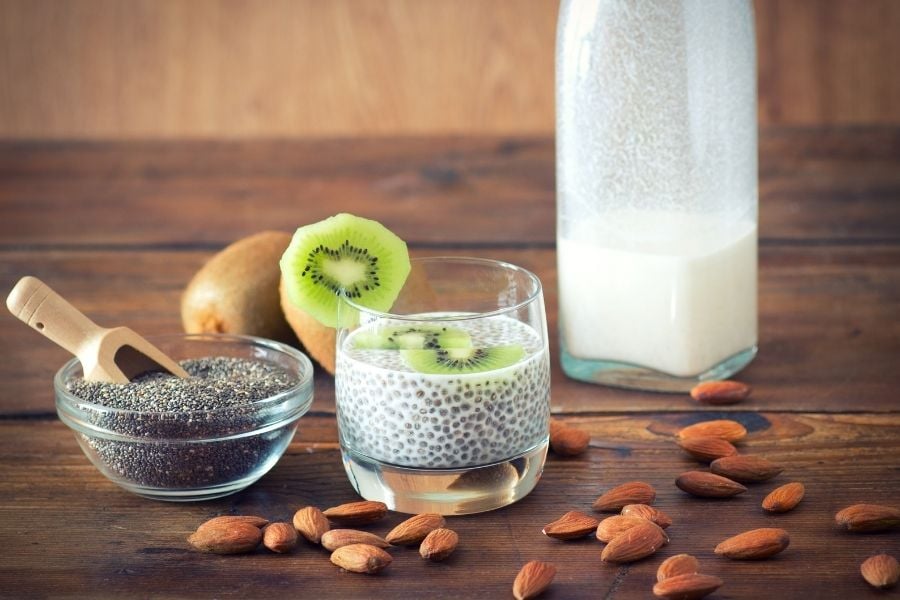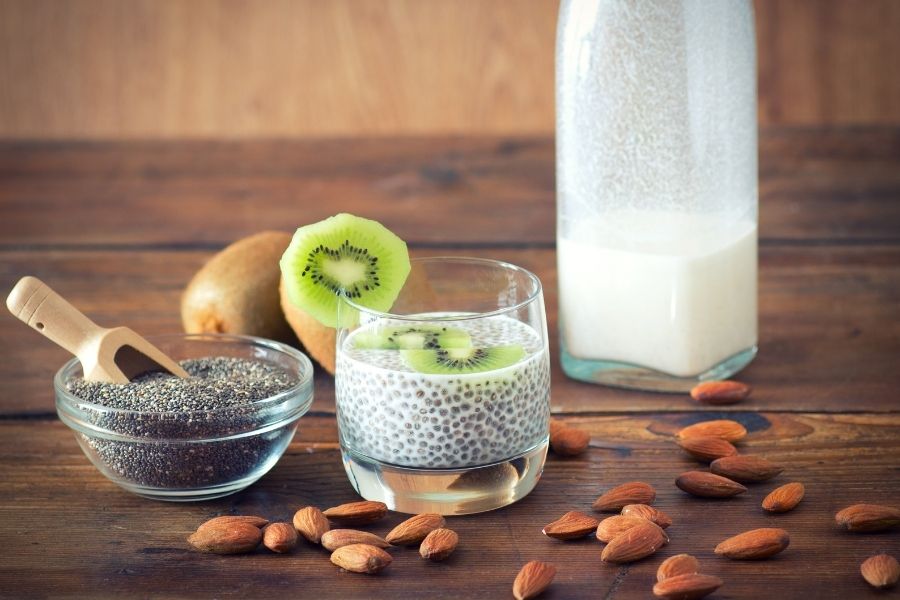Are you tired of eating foods that don’t agree with your stomach? Digestive issues can be unpleasant, but we’ve all experienced them at some point—after all, it’s part of being a human! Your gut microbiome is an incredibly complex system, and it can feel difficult to fully understand it. But with a bit of extra knowledge and a trip to the grocery store, you can be well on your way to relieving your symptoms.
Our Naturopathic Doctor, Dr. Saira Kassam, is an expert when it comes to digestion. Through lifestyle changes, blood work, stool testing, and food sensitivity testing, she helps patients improve their gut health from the inside out. When it comes to keeping your gut in check, incorporating easy-to-digest foods is a great place for anyone to start. We interviewed Saira to hear her top 8 recommendations, but first, why do certain foods cause those not-so-pleasant symptoms to begin with?

Getting To Know Your Gut
When you hear the word bacteria, you might assume all forms are bad. The truth is that both ‘good’ and ‘bad’ types exist, and your gut needs both to function.
“There’s a very delicate balance between intestinal flora in the digestive system when it comes to unfriendly and friendly bacteria,” Saira explains. “The role of that bacteria in the gut is to absorb vitamins and minerals, help to regulate hormones, make sure your immune health is where it should be, and regulate/remove toxins that shouldn’t be there.”
Ideally, the number of bacteria in your gut should be 50% friendly and 50% unfriendly. But when you have an imbalance, issues can start to arise. “It can be upset or disrupted by things like stress, processed foods, lots of caffeine, or long-term use of medications,” she says. This is why it’s important to eat foods that help you maintain that diversity. Balanced bacteria = happier gut! So, which easy-to-digest foods should you add to your cart?
1) Sauerkraut
It might not be the most popular food, but sauerkraut can do wonders for your gut. “Sauerkraut is a really probiotic-rich food. It helps to increase the diversity of the gut, and that diversity will dictate the balance between friendly and unfriendly bacteria,” Saira says.
Probiotics are otherwise known as ‘healthy’ forms of bacteria and yeast. They can help to improve your immunity and maintain a healthy pH in the gut.
2) Kombucha
Kombucha seems to have grown in popularity in recent years. Many retailers—even corner stores and coffee shops—offer different brands and flavours, and there’s plenty of local brands to choose from. Not only is kombucha delicious, but it’s also a great option for improving your digestion.
“Kombucha is used by the friendly bacteria in the gut to provide energy for those gut cells,” shares Saira. It’s rich in probiotics just like sauerkraut, so it’s worth adding a bottle (or two!) to your grocery cart.

3) Asparagus
We’ve covered what probiotics are, but have you ever heard of prebiotics? Essentially, they are a form of carbohydrate that humans are unable to digest. When we consume them, prebiotics act as food for the probiotics in our gut, which helps promote more friendly bacterial growth.
Asparagus is an excellent way to get prebiotics in your diet while also upping your vegetable intake. Try it roasted in the oven with some olive oil and spices for an easy-to-digest dinner side.
4) Cabbage
“Cabbage is really high in L-Glutamine, which is an amino acid that helps to maintain gut integrity. It helps increase the mucous layer in the gut, which is meant to be very protective,” explains Saira.
If your gut cells don’t have food, the bacteria will eat away at that lining and mucous. As a result, the delicate balance in your gut can be disrupted. Try adding cabbage to soups, stews, or spring rolls!
5) Ground Flax Seeds
This one is easy to incorporate into any diet and comes with several impressive health benefits. Flad seeds are high in Omegas, which are anti-inflammatory, and they’re also high in fibre which helps the digestive processes move along more easily.
“Fibre is fermented by the gut bacteria, which is converted to short-chain fatty acids, which again is energy for those cells,” Saira says. “And short-chain fatty acids are also anti-inflammatory.”
Reach for ground instead of whole flax seeds so you absorb the nutrients more easily. You should also keep them in an air-tight container in the fridge to avoid them going rancid.

6) Chia Seeds
Chia seeds are a great source of iron, calcium, magnesium, fibre, and Omegas. Believe it or not, they’re also a great source of protein! Chia seeds are definitely worth a spot in your pantry and make a great partner in crime for your ground flax seeds as well.
“I’m always saying to patients that 1 tablespoon of chia, and 2 tablespoons of flax, is a great way to make sure your diet is really diverse,” says Saira. Try adding them to your smoothies, oatmeal, or yogurt!
7) Kiwi
Fruit lovers unite! A list of easy-to-digest foods wouldn’t be complete without some of nature’s very own candy. According to Saira, kiwi can work great for constipation for a number of reasons. It’s a great source of fibre and helps produce the short-chain fatty acids that gut cells live off of.
“It’s also rich in proteolytic enzymes, which help to break down protein. This is why it’s so good for digestion in both the stomach and the small intestine,” she adds. Want to take your nutrition to the next level? Eat the kiwi skin, too! If you can get over the fuzzy texture, eating the entire fruit will up your fibre and antioxidant intake even more. Just make sure to wash it first!
8) Black Elderberries
The last easy-to-digest food on our list might surprise you because it’s not the most widely known fruit. But black elderberries are a great source of polyphenols, which help beneficial bacteria grow and inhibit pathogenic bacteria from growing.
Saira recommends having 2/3 of a cup to 1 cup for a serving, which will give you about 1400 grams of gut-friendly polyphenols. Look for them in the frozen aisle and repurchase them often!
The foods in this list can be easily incorporated into any diet plan. They’re also easy to combine so you can make gut-healthy meals! Saira says that one of the easiest ways to incorporate them is with smoothies. “You could do 1-2 tablespoons of ground flax, 1 tablespoon of chia, a cup of black elderberries (or blueberries), and add in a kiwi,” she suggests. “It’s a really great way to get everything in there.”

How Long Does It Take To Digest Food?
While incorporating new foods in your diet, it’s important to take note of how your body is responding. When you eat, the food moves through the hollow organs of your digestive tract (including the esophagus, stomach, small intestine, and large intestine) where it is broken down and the nutrients are absorbed.
It takes approximately 24-72 hours to digest food, but it’s largely dependenton the types of food you consume. Some foods, like meat, can take much longer to break down completely compared to high-fibre foods like fruits and vegetables.
If something feels off with your digestion, it’s important to take note of your symptoms. Our bodies let us know when something is wrong. Don’t overlook any changes or discomfort you might be experiencing.
When To Visit a Naturopathic Doctor
When it comes to your digestive health, prevention is key. “It’s always good to optimize the digestive processes by eating the right foods and eliminating the wrong ones. But I do find that people tend to wait until their symptoms get really, really bad,” Saira shares.
Common examples of symptoms can include losing tolerance to multiple different foods, having regular bloating, gas that’s more prominent and uncomfortable, or pain in the abdominal region. If you notice any of these, it’s a telltale sign that you should visit a doctor such as Saira.
“It’s never too late to see us, but coming in when you start noticing the signs that your digestion is off is good for prevention,” she concludes.
At HealthOne Wellness, we offer a Gut Health Program designed specifically to help people experiencing digestive upset. Saira will work with you one-on-one to help you maximize digestive enzyme secretion, ensure optimal nutrient absorption, promote a healthy balance of gut flora, eliminate dysbiosis, and work towards healthy bowel movement and stool formation.
The health of your gut matters because it’s linked to so many other areas of your health. Increasing research shows that it is linked to our immune systems, mental health, skin health, stress management, energy levels, mood, and even disease risk! Adding these easy-to-digest foods into your diet is one small step you can take towards improving your digestion and health in the long run.
One Life. Live Inspired.




